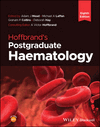Adult acute lymphoblastic leukaemia
Clare J Rowntree
Department of Haematology, University Hospital of Wales, Cardiff, UK
Search for more papers by this authorAdele K Fielding
Centre for Blood Research, Hull York Medical School, University of York, UK
Search for more papers by this authorClare J Rowntree
Department of Haematology, University Hospital of Wales, Cardiff, UK
Search for more papers by this authorAdele K Fielding
Centre for Blood Research, Hull York Medical School, University of York, UK
Search for more papers by this authorAdam J Mead PhD, FRCP, FRCPath, FMedSci
Haematopoietic Stem Cell Biology Laboratory, Medical Research Council Molecular Haematology Unit, Medical Research Council Weatherall Institute of Molecular Medicine, University of Oxford, Oxford, UK
Search for more papers by this authorMichael A Laffan DM, MRCP, FRCPath
Department of Immunology and Inflammation, Faculty of Medicine, Imperial College London, London, UK
Search for more papers by this authorGraham P Collins DPhil, FRCP, FRCPath
Department of Haematology, Oxford Cancer and Haematology Centre, Oxford, UK
Search for more papers by this authorDeborah Hay DPhil, MRCP, FRCPath
Nuffield Division of Clinical Laboratory Sciences, Radcliffe Department of Medicine, University of Oxford, Oxford, UK
Search for more papers by this authorA Victor Hoffbrand MA, DM, FRCP, FRCPath, FRCP (Edin), DSc, FMedSci
Emeritus Professor of Haematology Honorary Consultant Haematologist
University College London, London, UK
Royal Free Hospital, London, UK
Search for more papers by this authorSummary
Acute lymphoblastic leukaemia (ALL) is an aggressive malignancy of T or B lymphocytes. Sometimes considered more a disease of childhood, it nonetheless affects adults, with an increasing incidence in older age. The treatment of adults is based on that of children. However, there are key differences between them – both in genetics and tolerance of treatment – leading to a much less good eventual outcome to treatment in adults. This chapter examines the clinical presentation, diagnosis, prognostic factors and first-line therapy of ALL in adults, based on current literature. There is an emphasis on the practical aspects of diagnosis and supportive care. The role of stem cell transplantation in the treatment of adult ALL and the management of relapsed/refractory disease using novel, targeted therapies is also briefly discussed
Selected bibliography
- Goldstone AH , Richards S , Lazarus HM et al . ( 2008 ) In adults with standard-risk acute lymphoblastic leukemia, the greatest benefit is achieved from a matched sibling allogeneic transplantation in first complete remission, and an autologous transplantation is less effective than conventional consolidation/maintenance chemotherapy in all patients: final results of the International ALL Trial (MRC UKALL XII/ECOG E2993) . Blood 111 ( 4 ): 1827 – 33 .
- Hough R , Rowntree C , Goulden N et al . ( 2015 ) Efficacy and toxicity of a paediatric protocol in teenagers and young adults with Philadelphia chromosome negative acute lymphoblastic leukaemia: results from UKALL 2003 . British Journal of Haematology 172 ( 3 ): 439 – 51
- Kantarjian H , Stein A , Gökbuget N et al . ( 2017 ) Blinatumomab versus chemotherapy for advanced acute lymphoblastic leukemia . The New England Journal of Medicine 376 ( 9 ): 836 – 47 .
- Ludwig W , Rieder H , Bartram CR et al . ( 1998 ) Immunophenotype and genotypic features, clinical characteristics, and treatment outcome of adult pro-B acute lymphoblastic leukemia: results of the German multicentre trials GMALL 03/87 and 04/89 . Blood 92 ( 6 ): 1898 – 909 .
- Maury S , Chevret S , Thomas X et al . ( 2016 ) Rituximab in B-lineage adult acute lymphoblastic leukemia . The New England Journal of Medicine 375 ( 11 ): 1044 – 53 .
- National Institute for Health and Care Excellence ( 2010 ) Clinical Guideline 92 . Venous thromboembolism: reducing the risk.
- Rowe J , Buck G , Burnett A et al . ( 2005 ) Induction therapy for adults with acute lymphoblastic leukaemia; results of more than 1500 patients from the international ALL trial: MRC UKALL XII/ECOG E2993 . Blood 106 ( 12 ): 3760 – 7 .
- Vardiman JW , Thiele J , Arber DA et al . ( 2009 ) The 2008 revision of the World Health Organisation (WHO) classification of myeloid neoplasms and acute leukaemia: rationale and important changes . Blood 114 ( 5 ): 937 – 51 .



